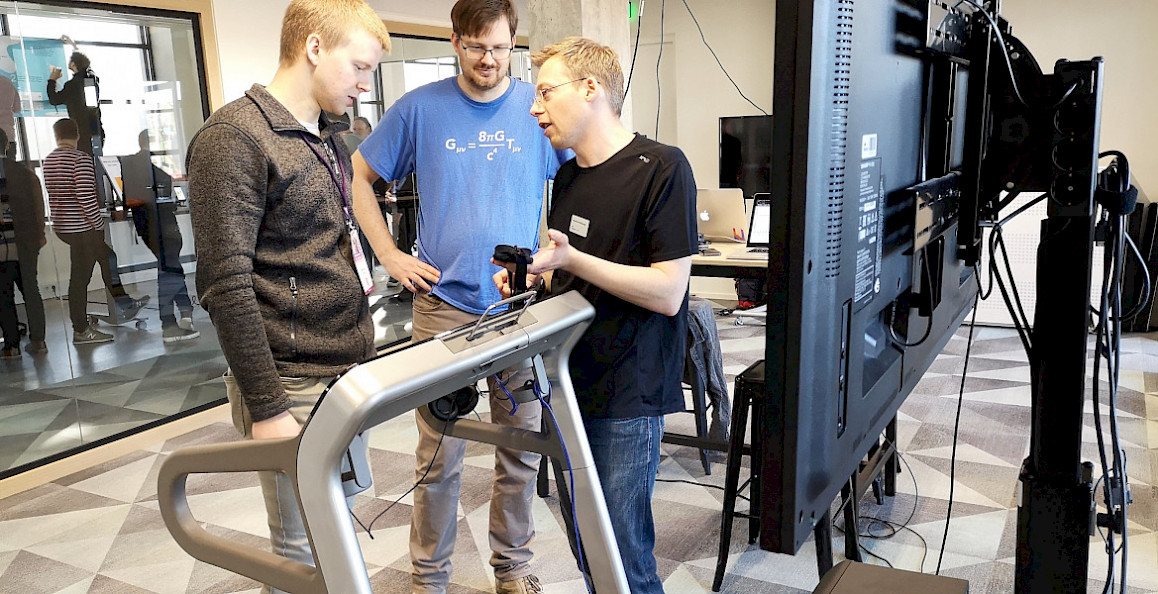Music Enabled Running
 Music has impact
Music has impact
Music motivates us, it measurably affects our mood and performance, but we don't know exactly how, explains teacher-researcher Olaf Janssen: "Enough research has been done on the role of music. There are measurable effects in our brains, but how that then works we do not fully understand, but what we do see is that music has a direct influence on the way we walk. By collecting enough data about walking behaviour and music, and analysing the interaction between these two, we can discover what patterns there are. With this knowledge, we can use music in a targeted way to change and improve your walking pattern. That, in a nutshell, is what we are working on with Music Enabled Running. Of course, we have to answer many questions. What is better running? What other factors are there? How do we collect that data?"
Collecting data
Janssen is working with fellow researcher Bernd-Jan Witkamp on this project, where data collection has long been a priority. Foot sensors are used to collect data on walking behaviour, Janssen explains: "There are many factors. Think of foot impact, rotation, number of steps, contact time. While the sensors are collecting this data, the runners listen to music via Spotify. The streaming service provides extensive data on every second of music, which we need to link behaviour to musical characteristics. In this way, we can discover what can influence running behaviour. However, the user's own playlist remains leading. If the music does not appeal to you, the effect is lost, according to Janssen.
Student project with many steps
The runners are equipped with foot sensors, headphones and an accelerometer (smartphone). While running, they will collect data that will be sent to an app developed by Fontys students. As with most projects within the Fontys ICT InnovationLab, various student groups are working on Music Enabled Running. ICT & Technology students even researched whether it would be interesting to develop sensors themselves, Janssen says: "In the end, we bought an existing model, but first they studied it. At each step, we hooked up other students with the right specialism. The app was developed by students from the ICT & Smart Mobile specialisation. A group from ICT & Media Design worked on the branding and user experience of the app, while students from ICT & Applied Data Science developed the machine learning algorithms that analyse the data. That is also how our form of education works, students learn in practice and work on innovations themselves." Many steps have been taken, but there are plenty of challenges. As a result, a parallel project involving data sonification has been somewhat pushed aside: "In addition to steering walking behaviour through music, you could also use direct audio feedback to correct it. That combination is what we have in mind and could really make the difference, but for now that is still in the future."
So what is really good running?
Serious runners don't listen to music. The sound of your footfall, the check on your breathing, that's what happens by hearing. So should we run with music? Janssen admits that running without music and perhaps even barefoot is ideal, but for many runners, that is not the reality: "For many runners, music makes the compulsory exercise more enjoyable. So you should not take that away, but encourage it. It is precisely recreational runners who benefit from positive support for their sporting activities. A higher level of experience of success motivates them, but with such a solution, they can also continue to run injury-free. Both are important for a healthy society. Moreover, this technique translates to other sports, rehabilitation and care. Think of people with a condition that limits body control. What if the right music reduces the symptoms? That can improve someone's quality of life."
Music Enabled Running is part of the Vitality Living Lab project. Also read more about the GROWTHmoves project: exergames voor de basis.